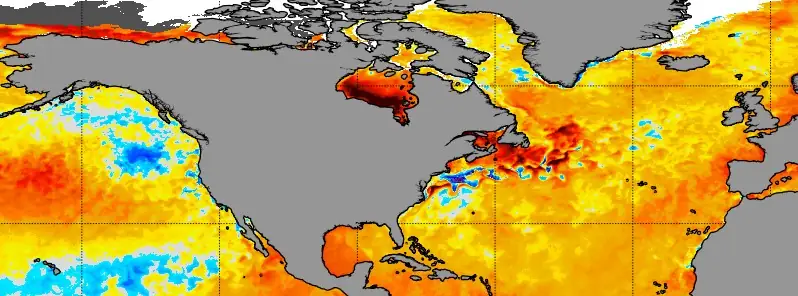Strongest marine heat wave in 40 years off Canada’s East Coast

A severe marine heat wave was recorded off Canada’s East Coast this summer, according to data compiled by Fisheries and Oceans climate scientist Peter Galbraith. The event, lasting from the last three weeks of July to the first week of August, saw a weeklong temperature spike off Newfoundland averaging 6.7 °C (12.1 °F) above normal.
Fisheries and Oceans climate scientist Peter Galbraith compiled the alarming data for the World Meteorological Organization, a United Nations agency tasked with monitoring extreme weather events globally. The surface temperatures reached unprecedented highs in several regions, including the Scotian Shelf, Gulf of St. Lawrence, the Newfoundland Shelf, and the Labrador Shelf. In July, the recorded ocean surface temperatures were 2 to 4 °C (3.6 to 7.2 °F) above normal — the warmest in the 41-year history of satellite data collection.
Galbraith’s measurements showed that off Newfoundland’s Flemish Cap, where surface temperatures normally hover around 12 °C (53.6 °F), the temperature surged to 18.6 °C (65.5 °F). “Anything over like 1 °C (1.8 °F) is already off normal. So 6.5 °C (1.7 °F) is the largest single weekly anomaly for a fairly large area in the whole satellite record for our Eastern Canadian waters,” he said.
The marine heat wave lasted an unusually long time, encompassing the last three weeks of July and the first week of August. Galbraith pointed out the rarity of the event’s spatial extent, covering the entire Atlantic zone off Canada’s East Coast. Typically, only parts of the Atlantic zone experience elevated temperatures, but this event was different.
Marine heat waves are generally defined as periods where surface waters remain in the uppermost 10% of historical temperatures for five or more consecutive days. The maximum anomaly was 6.7 °C (12.1 °F) above the norm in the Atlantic, far surpassing a similar event in the Pacific where the maximum anomaly was only 3.5 °C (6.1 °F) above normal.
DFO scientists have also reported an ongoing marine heat wave off British Columbia, which peaked in early August and covered 90% of Canada’s 320 km (200 miles) exclusive economic zone in the Pacific. While marine heat waves in the Pacific have become more common, the recent event in the Atlantic was classified as “unprecedented.”
Notably, the adverse impacts of marine heat waves extend beyond immediate temperature anomalies. Previous marine heat waves have been linked to devastating effects such as algae blooms, coral bleaching, and local fish loss. However, a paper published in the scientific journal Nature on August 30 contained some optimistic data: bottom-dwelling fish showed surprising resilience during 238 marine heat waves recorded between 1993 and 2019.
As for long-term trends, 2022 was recorded as the warmest year ever off Canada’s East Coast, breaking records set only nine years earlier. The recent summer’s marine heat wave was significant enough to potentially affect the overall average for 2023, said Galbraith.
References:
1 “Unprecedented” marine heat wave hits Canada’s East Coast this summer – The Weather Network – October 5, 2023
2 Marine heatwaves are not a dominant driver of change in demersal fishes – Nature – August 30, 2023
Featured image credit: NOAA

Commenting rules and guidelines
We value the thoughts and opinions of our readers and welcome healthy discussions on our website. In order to maintain a respectful and positive community, we ask that all commenters follow these rules.